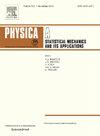Impact of Black Swan Events on Ethereum blockchain ERC20 token transaction networks
IF 2.8
3区 物理与天体物理
Q2 PHYSICS, MULTIDISCIPLINARY
Physica A: Statistical Mechanics and its Applications
Pub Date : 2024-10-05
DOI:10.1016/j.physa.2024.130129
引用次数: 0
Abstract
The Ethereum blockchain and its ERC20 token standard have revolutionized the landscape of digital assets and decentralized applications. ERC20 tokens are programmable and interoperable tokens, enabling various applications and token economies. Transaction graphs, representing the flow of the value between wallets within the Ethereum network, have played a crucial role in understanding the system’s dynamics, such as token transfers and the behavior of traders. Here, we explore the evolution of daily transaction graphs of ERC20 token transactions, which sheds light on the trader’s behavior during the Black Swan Events – 2018 crypto crash and the COVID-19 pandemic. By using the tools from network science and differential geometry, we analyze 0.98 billion of ERC20 token transaction data from November 2015 to January 2023. Our analysis reveals an increase in diverse interaction among the traders and a greater adoption of ERC20 tokens in a maturing Ethereum ERC20 financial ecosystem after the Crypto Crash 2018 and the COVID-19 pandemic. Before the crash and the COVID-19 pandemic, most traders interacted with other traders in an isolated or restricted manner, with each trader focusing solely on either buying or selling activities. However, after the crash and during the pandemic, most traders diversely interacted among themselves by participating in both buying and selling activities. In addition, we observe no significant negative impact of the COVID-19 pandemic on user behavior in the financial ecosystem.
黑天鹅事件对以太坊区块链 ERC20 代币交易网络的影响
以太坊区块链及其 ERC20 代币标准彻底改变了数字资产和去中心化应用的格局。ERC20代币是可编程、可互操作的代币,支持各种应用和代币经济。交易图代表了以太坊网络中钱包之间的价值流动,在理解系统动态(如代币转移和交易者行为)方面发挥了至关重要的作用。在此,我们探索了ERC20代币交易的每日交易图的演变,这揭示了交易者在黑天鹅事件--2018年加密货币崩盘和COVID-19大流行期间的行为。通过使用网络科学和微分几何的工具,我们分析了从 2015 年 11 月到 2023 年 1 月的 0.98 亿 ERC20 代币交易数据。我们的分析表明,在2018年加密货币崩盘和COVID-19大流行之后,交易者之间的多样化互动增加,在成熟的以太坊ERC20金融生态系统中,ERC20代币的采用率更高。在崩盘和 COVID-19 大流行之前,大多数交易者以孤立或受限的方式与其他交易者互动,每个交易者只专注于买入或卖出活动。然而,在股灾后和大流行期间,大多数交易商通过参与买卖活动进行了多样化的互动。此外,我们观察到 COVID-19 大流行对金融生态系统中的用户行为没有明显的负面影响。
本文章由计算机程序翻译,如有差异,请以英文原文为准。
求助全文
约1分钟内获得全文
求助全文
来源期刊
CiteScore
7.20
自引率
9.10%
发文量
852
审稿时长
6.6 months
期刊介绍:
Physica A: Statistical Mechanics and its Applications
Recognized by the European Physical Society
Physica A publishes research in the field of statistical mechanics and its applications.
Statistical mechanics sets out to explain the behaviour of macroscopic systems by studying the statistical properties of their microscopic constituents.
Applications of the techniques of statistical mechanics are widespread, and include: applications to physical systems such as solids, liquids and gases; applications to chemical and biological systems (colloids, interfaces, complex fluids, polymers and biopolymers, cell physics); and other interdisciplinary applications to for instance biological, economical and sociological systems.

 求助内容:
求助内容: 应助结果提醒方式:
应助结果提醒方式:


